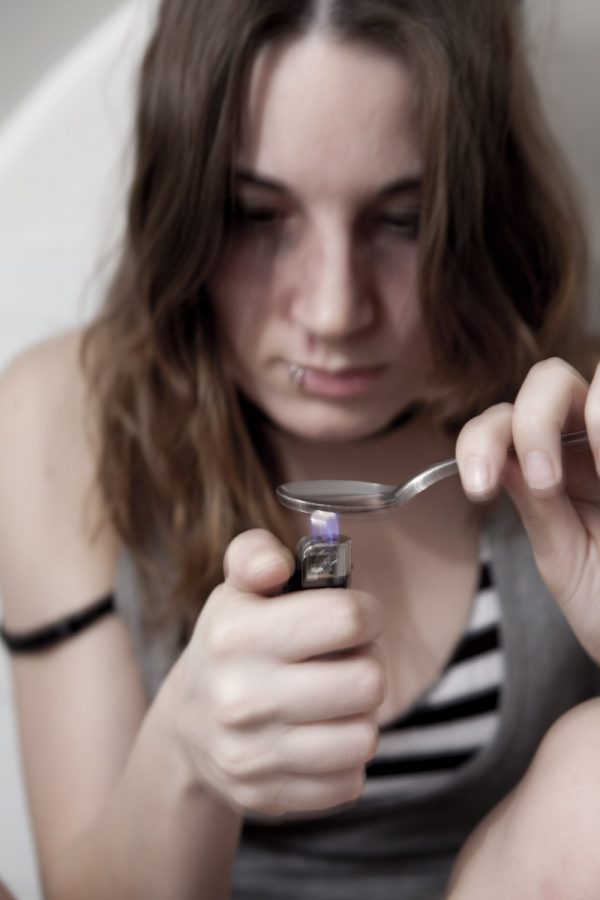Crystal meth: The moral inhibitor
May 4, 2016
My mom began using drugs when I was about six or seven years old. At first, I didn’t really know what was going on. By the time I was in fourth grade, I was living with my grandma since my mother could no longer take care of us. We lived in an apartment in downtown San Jose.
One day my mom came over; she had used crystal meth earlier that day. Crystal meth is the common name for crystal methamphetamine. The substance comes in clear crystal chunks or shiny blue-white rocks.
She started to act crazy and became angry. She grabbed tissue that was on the couch cushion in our living room, opened the tissue and began to call out for my older brother and dad. It was as if she thought they were inside the tissue, and kept telling them to get out. After that she grabbed a knife, walked into my grandma’s room, looked in the mirror and thought she saw ghosts. She wanted to break the mirror to keep the evil ghosts away.
My grandma was so scared, she called a family friend to come get my sister and I. My mom yelled so loud all the neighbors could hear what was going on. By the time our ride showed up, so did the police. As we were walking away, the police tried to arrest my mom. She did not go down without a fight. It took about eight cops just to get her down the stairs. She kicked and screamed, unwilling to go with them.
My parents were still married when my mom first started using. I noticed they were having disagreements — they would always argue and yell at each other, and the police made trips to our house on more than one occasion; their marriage was rocky.
My mom’s friend introduced her to crystal meth when I was six. At that age I had no idea what drugs were or what my mom was doing. At first she tried to hide her drug use from us, until I was about eight years old. My family explained that my mom was addicted to drugs and needed help.
Eventually the drug took over and several years later, she became homeless.
Crystal meth is a drug that can be snorted, smoked, injected or taken orally. Jimmy Isch, program coordinator at the Second Chance Hayward Recovery Center, and ex-crystal meth user for 20 years, explained that people continue to use meth because it is the most powerful energy mood booster in the world.
“It releases huge amounts of pleasure chemicals into the brain and makes you feel powerful, not hungry, and lies to you in your own voice and you believe it,” Isch said.
Methamphetamine increases the amount of the dopamine in the brain, the high levels of that chemical is what creates that “rush” feeling for users. These pleasure chemicals are normally and naturally released through sports, sex or accomplishments. Addicts use the drug to feel good about themselves; they become obsessed with things such as sex, collecting or dumpster diving. They learn different ways they can survive and become focused on this one thing, according to Isch.
Isch also said the drug is a moral inhibitor. As users become more and more dependent on the drug, it forces them to escalate to things they wouldn’t normally do just to get it.
“Meth addicts get with the person that can get them high in order to feed their addiction,” Isch said. Life becomes nothing but an obsession to get it and use it more.
Isch was previously a functioning addict. He was able to maintain jobs on and off. He would snort meth or put it in his coffee. It wasn’t until he started smoking the drug that he gave into the disease, and simply lived to use.
“Smoking it gets you higher, but it doesn’t last as long, you build a high tolerance and need more of it,” Isch said. He has now been clean for 13 years and 11 months. He lived in Fresno while using, then moved to Fremont and went through 16 months of treatment.
Some short term effects of meth are loss of appetite, dilation of pupils, disturbed sleep patterns, nausea, bizarre, erratic, sometimes violent behavior, hallucinations, hyperexcitability, irritability, panic and psychosis, according to the nonprofit group, Foundation for a Drug-Free World. Some long term effects are permanent damage to blood vessels of heart and brain, liver, kidney and lung damage, respiratory problems if smoked, malnutrition, weight loss, psychosis and depression.
As Isch talked, I started to realize that many of the things he talked about connected to my mom. My mom smoked crystal meth, she became addicted to it, she craved it and did anything in her power to get it — when I was nine years old, my mom started dating a drug dealer. Over time, she lost a lot of weight and there were occasions when she hallucinated.
When I was young, I used to be upset that my mom used the drug. At about 11 years old, I asked her, “You don’t love me or my brothers and sister more than you love the drug?” She said she loved us, but I didn’t understand how she could choose the drug over us.
Many meth users go through the same deception that the drugs create. When using the drug, former relationships become problems.
“If the people in your life would leave you alone about drugs, everything would be great,” Isch said. “You tell yourself lies.”
My family used to pressure my mom to quit and go into recovery. She probably thought we were the issue and not the drugs, and that is probably why she isolated herself, denied help and became homeless.
Isch said that nobody can make an addict get clean, “They must surrender to the process.”
I hope one day my mom will be ready to change and surrender. I would love to see her healthy, happy and safe again.
















